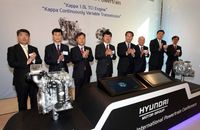Hyundai announces its Future Powertrain Strategy at the '2012 Hyundai Motor Group International Powertrain Conference'
SEOUL, SOUTH KOREA – Oct 24, 2012: Hyundai Motor Group today unveiled its latest powertrain technologies and future plans at ‘The 12th Hyundai Motor Group International Powertrain Conference,’ with the theme of ‘Convergence of Human, Environment, and Powertrain.’
At the annual conference the Group explained the current development status of its major powertrain technologies and announced future development directions.
In line with the dominating global trend of engine downsizing, Hyundai has been expanding the inclusion of Turbo Gasoline Direct Injection (T-GDI) engines to its models. The T-GDI engine is a next-generation engine boasting fuel economy, eco-friendliness, and high performance.
While its compact (1.6-litre) and mid-size (2.0-litre) models are already equipped with such engines, Hyundai will continue its efforts to improve T-GDI technology to develop ‘small, yet strong’ engines, offering unprecedented driving pleasure.
In terms of diesel engine development, Hyundai plans to continue expanding its diesel line-up based on the advanced technology of the existing U, R, and S engines to respond more effectively to the diversified demands of global customers.
Hyundai aims to become the leader in transmission technology with its efforts to develop light-weight and highly fuel-efficient transmissions, offering a combination of efficiency and performance. As the first automaker to develop an 8-speed auto transmission for the rear wheel drive vehicle in-house, Hyundai is focusing on developing transmissions for premium models as well.
Furthermore, Hyundai will offer more customised powertrains in response to local conditions to boost its overseas sales. For example, while Hyundai plans to increase the ratio of T-GDI engine-equipped models in its major markets including the U.S. and China, it also plans to introduce flex-fuel engines for countries better suited for them. For countries with extreme weather conditions, Hyundai will provide engines that deliver sustainable performance regardless of changes in temperature.
Hyundai displayed the Kappa 1.0-litre TCI engine, Kappa 1.2-litre T-GDI engine, Gamma 1.6-litre T-GDI engine, Nu 2.0-litre CVVL engine, Theta 2.0-litre T-GDI engine, U2 1.1-litre WGT diesel engine, Euro 6 R 2.0-litre diesel engine, and the Kappa CVT (Continuously Variable Transmission) to showcase its advanced powertrain technology.
The Kappa 1.0-litre TCI (Turbocharger Intercooler) engine boasts exceptional performance in comparison to the segment’s rivals, delivering maximum power of 78kW and maximum torque of 137Nm without sacrificing its eco-friendliness. Indeed, it emits less CO2 than its original petrol model.
A variety of technologies were adopted to maximise fuel economy and performance of the Kappa 1.0-litre TCI engine including 12-valve DOHC, integrated turbocharger and offset crankshaft. In addition, aluminium cylinder block, plastic intake manifold and head cover reduced the total weight while the ladder frame decreased NVH.
The conference was designed to offer industry experts an opportunity to discuss next-generation powertrain development directions and share innovative technologies in response to tougher environmental policies worldwide. Around 1,000 world-class powertrain experts and academics participated in the conference, including members from Bosch, Continental, Delphi, Magna Powertrain and Denso.
Throughout the two-day conference, 44 theses are to be presented in six sessions. Thesis topics include next-generation petrol technology, exhaust and after-treatment technology, diesel innovation technology, exhaust reducing technology, high efficiency transmission and improving driving experiences.



